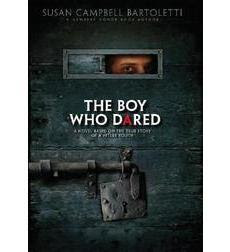Bartoletti offers another perspective on the Holocaust, demonstrating that even if the effort proves unsuccessful, the courage and convictions of a minority should be motivation to speak the truth rather than remain silent. It's a message that must be continually emphasized as a lasting legacy of the Holocaust.-Rita Soltan, Youth Services Consultant, West Bloomfield, MI (c) Copyright 2010.
Published by: Scholastic Press copyright:2008
As a part of Hitler youth Helmut Hübener was influenced by the other Nazi’s that he was around all the time and was strictly forbidden to communicate or listen to anything outside that confides of his own country. When given a radio, which is strictly forbidden, Helmut is able to listen to the views that the BBC broadcast. The BBC opens his eyes to the views of the people outside of Nazi Germany and he begins to see things differently. Hoping to make an influence on the people of Germany and make a difference to the people suffering from the Nazi Regime, Helmut begins to rebel. Helmut gets some of his friends to help him spread what he hears on the radio to the people in his hometown. The Gestapo, find him and arrest him for going against the rules. He is put in prison and awaits his execution. The story starts off with him in the cell and is written in mostly flashbacks of what happened to get him into that cell. Based off of a true story The Boy Who Dared is a great book to help teach about the holocaust and its affect on Germany, other countries and the people under the Nazi influence.
Reading level: 6-9 Lexil: 760L
Suggested Delivery: Independent read
Vocabulary: Treaty of Versailles, the Great War, Nazi, National Socialist Party, Communist, Reich, Parliament, Regime, Lieutenant, stoic, Fatherland, boycott, warmonger, brownshirt,weiman republic, U-boat, propaganda, blitzkrieg, defeatist, black market, ration, plutocracy, idealism, denounce, inflation, swastika, doctrine, dissent, inflammatory,
http://www.youtube.com/watch?v=VunoYLVBon0 watch the author Susan Campbell Bartoletti, tell what the story is about as well as providing insight into the essential question, “what am I willing to stand up for?”
http://www.scbartoletti.com/ the authors’ website offers insight into the author including a biography, other books that she wrote as well as contact information to get in touch with her.
http://www.studystack.com/flashcard-610548 This website has flashcards with answers on them about the book to practice and test knowledge about the book.
Activities to increase comprehension:
Before reading: This book should be read in a unit where the students are already learning about the Holocaust. There are a lot of historical references such as the treaty of Versailles, parliament, and Communist in this book that the students should learn about beforehand. Going over some key terms will help the students understand the book.
During reading: Have the students continue to learn about the Holocaust, throughout the book ask them questions and have them ask question about what is going on in the book to ensure that they are understanding the plot and keeping up with the reading.
After reading: Have the students answer the question “what am I willing to stand up for?” Helmut has to stand up for what he believes in knowing that he could get in a lot of trouble for it. Having the students think about what they are willing to stand up for will have them be able to connect with the protagonist in the story and really show them what he had so go through. Making a text to self connection will give them empathy for Helmut and a better understanding of the holocaust and the people that were affected by it.



No comments:
Post a Comment